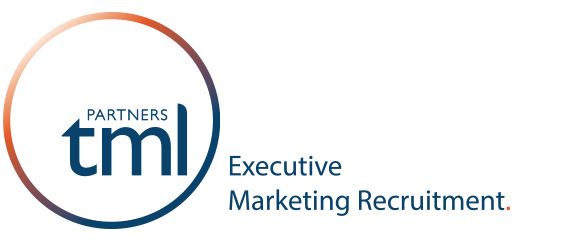
In this article James Gilford takes a closer look at some common themes about getting the first marketing hire right.
Many sectors and industries are now experiencing a sustained period of change with new entrants coming into the market who are challenging the traditional incumbents. This has seen increased fragmentation across sectors and an entirely new competitive environment. From Fintech and Insuretech through to Edtech and SaaS, there is constant disruption and in some cases game changers with which comes new challenges to gain market share.
At tml Partners we are increasingly being asked to consult on setting up new marketing functions within SME and start-up businesses, so that they can grow their business efficiently in this challenging and populated space.
Businesses use marketing to communicate their value proposition, mission and purpose, so they can uniquely appeal to their target audience. The traditional organisations have already invested heavily in their marketing and the SMEs and start-ups have the dual challenge of having to make their voice heard amongst the noise already out there, but often with much smaller budgets than their established competitors. These are the concerns of your first marketing hire, but before this, SMEs and start-ups must make the leap and invest in marketing their business by making that first hire. The most common questions we are asked through this process is where to start and how to make it successful.
What’s the business case for establishing a marketing function
How will establishing a marketing function, which will likely be a significant investment, add value to your organisation? Aside from the arguments already mentioned for marketing investment, which are keeping up with the competition and getting your voice heard, there are numerous reasons why establishing a marketing function will help your organisation.
The start-ups we have worked with often have a heavy focus on commercials and the profitability of the business, without giving a huge amount of attention to the brand. With the amount of competition in these marketplaces, it’s essential to develop a strong brand so that customers will recognise you and keep you front of mind. This is where you need a marketing professional. For SMEs it is broadly the same, although these businesses are further along in the lifecycle and have established a brand to some extent, businesses need to have the professional capability to grow the brand with the business.
There should also be a shift in focus when a business establishes a marketing function. Marketing activities are customer focused. The needs and expectations of consumers are changing rapidly and to meet these needs, a business must understand their customer and focus all activities on adapting their offering to be relevant. Having a great product on launch isn’t enough, that product needs to evolve and your route to market needs to be continually tweaked. The right marketing professional will manage this so that your business can keep up with the pace of change and rising expectations of consumers. At the same time, understanding the consumer and defining your route to market will mean that a business has a far stronger grasp on demand, meaning it can be predicted and therefore assist with future resourcing decisions.
What are the challenges of establishing a new marketing function
Despite the business case being strong, there are inevitably challenges with establishing a marketing function. Firstly, knowing when to take the plunge and make that first hire. As it is a big decision which requires investment, often companies delay. This can be detrimental to taking market share as it is highly likely that there is another company developing something like you, and they might raise their profile with consumers first. In an ideal world, marketing should be a consideration from the beginning, in reality this isn’t always the case. Once there are the resources to bring on board marketing talent, grasp the opportunity.
The next challenge is knowing what level to hire at. This might be something that you put down to budget, go as high as you can afford, but there are different options here. Often for smaller businesses, a full time CMO might not be needed as once the strategy has been set, it just needs to be implemented, which might be a more suitable role for a Head of Marketing or even Marketing Manager. Businesses should consider an interim CMO hire who can define the strategy and then a more junior marketing professional can implement it. If you are hiring for a permanent CMO role consider what other internal resources you need to support this position. Having marketing representation on your board can be hugely beneficial in growing your business and maintaining a customer focus but you need the internal infrastructure to be able to carry out the activities that are required.
Once you’ve decided what level to hire at, the next challenge is deciding what sort of background the individual should have. Many of our clients with businesses primed for rapid growth look outside of their direct sector to hire. For example, a marketing professional who has experience of growing a tech company might be just the right hire for a fintech start-up, rather than looking to traditional financial services experience. A word of caution, however. Just make sure that your organisation can carry out change and adapt to the advice of someone from outside of your sector, if not then this will likely lead to a short tenure.
How to prepare for the hire
Introducing a new function to your business isn’t as simple as hiring and on-boarding. You need to prepare your business so that it’s ready for the change that will come and give your new placement the best possible chance of success. The first step is to understand the objectives behind making the hire. Set objectives, outline a job description, define reporting lines and think about KPIs for the individual once they join. These are all things that should be discussed at interview process, but it’s worthwhile bringing all key decision makers on board with the hire before you get to interview stage. The focus here should really be on business objectives rather than specific marketing activities. Once you have pulled together all this information you will be able to map this to certain skillsets and start to understand the sort of marketing professional who will be able to achieve your business goals.
That is the business strategy side of it, now for a more practical side. Once your new marketing function is established it’s likely there will be some change within your organisation. Is your business ready and able to roll with this? This is down to management’s ability to change. Everyone needs to be on board as if there is a block this will slow down or halt the implementation of strategies that could move your business forward.
How are you going to find your marketing talent? A decision needs to be made as to whether you use a recruitment consultant or advertise for the role yourself. The latter requires significant internal resource so make sure you have this at your disposal. If working with a headhunter, use the scope of the role and the objectives of the business to determine what sort of recruiter will work for you. Do you want to go with a marketing-specific recruiter or an industry specialist for example? A marketing specialist might well potentially have a more diverse pool of candidates on their books to explore the option of recruiting from outside of your direct industry to bring about change more quickly, or achieve specific objectives such as growth.
If you are working with a recruiter they will assist with the interview tactics and ensure that you are focusing the process on the key factors to lead to a successful hire. If working on recruitment yourself, ensure that you considered your interview strategy and align your questions with your KPIs for the role, and your business objectives in general.
First 100 days
Once you have found your preferred candidate and your offer has been accepted, it doesn’t end there. The first 100 days in their new role are the most important in making sure that the hire is a success. They will want to make an early impact – is your business ready for this and will you be able to empower them enough to be able to do so? Can you offer any kind of senior executive coaching? This is especially important if your new marketing leader is from a different industry but is valuable in any business, of course only if budgets will allow. Have you set clear objectives and are all your key members of staff on board with these objectives? Most importantly, reaffirm the business culture with your new hire.
Whatever you have worked hard at building up must be translated in your marketing activities so that your customers understand who you are and what you are about – today this carries as much weight with the modern-day consumer as understanding what you do.
tml Partners specialise in executive marketing recruitment.

James Gilford is a seasoned headhunter and runs the financial services practice.




